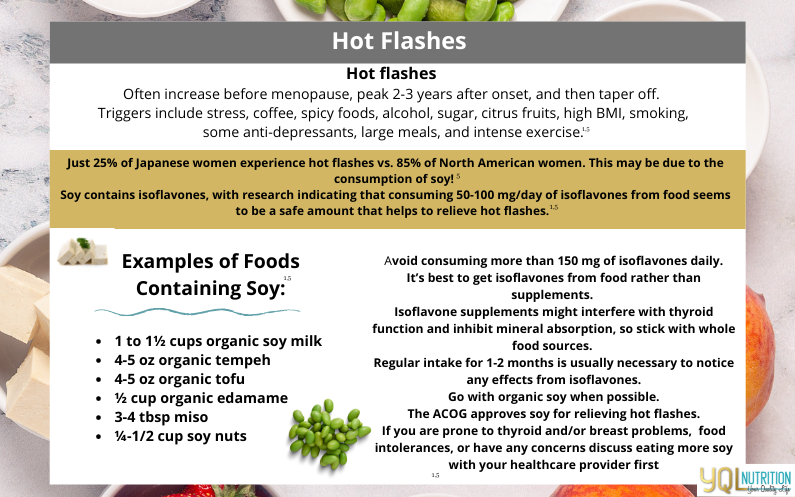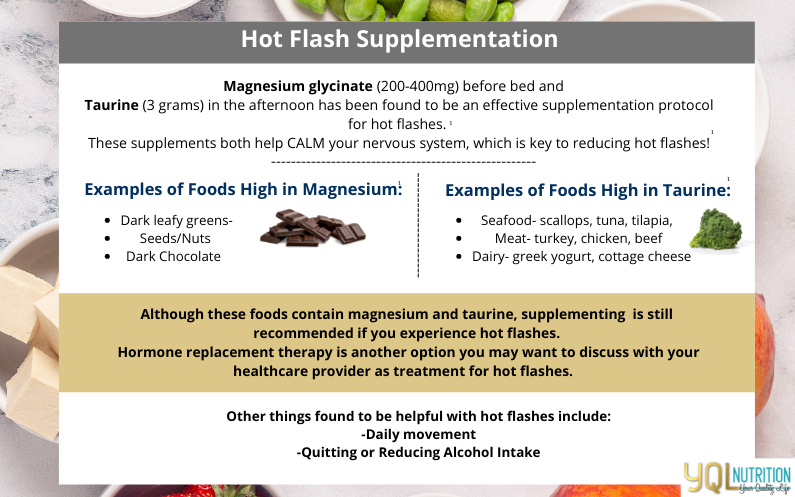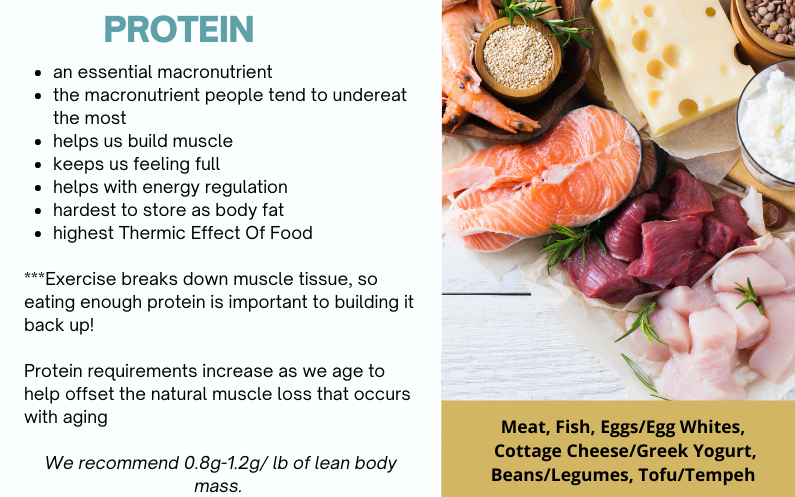YQL Nutrition Guide to Menopause
Time to bust some myths and bring some awareness to a very interesting topic…
Let’s talk about… MENOPAUSE!
Regardless of what age you are, we would encourage you to read this blog to learn more about perimenopause and menopause. Why do we suggest learning about perimenopause/menopause even if you are, say 20 years old? Many of the tips and tricks for addressing health concerns during this transition are beneficial for women of all ages!
Moreover, there is a stigma associated with menopause that we want to address in this blog, and with that comes bringing awareness around menopause to everyone regardless of age or gender. So yes… if you are a male and you have made it this far, please keep reading!
This stigma surrounding menopause is that menopause is viewed as “taboo” or as a “problem”, rather than the privilege that it is (1). Indeed, it is a privilege, because if you enter menopause it means you had the privilege of living into your 40’s or 50’s (1). Many women discuss that they fear menopause as it is synonymous with “getting older” or “losing their youth” (1). In our society, youth is often valued, and thus, discussing menopause, or stating that you are currently in this stage of life, may have negative connotations. We wish to change this narrative by encouraging you to shift your mindset around menopause to recognize that it is something you get to experience as you had the privilege of aging. We hope that through reading this blog, you feel empowered to use menopause as a reason to learn more about your holistic health and create positive change in your life.
Because guess what?! Women have expressed that one of the most positive things about menopause is the opinions of others begin to lose power, as they find a renewed confidence in themselves (1). We wish this for you, and hope that this blog will help you achieve that!
So, why are we starting this blog by focusing on stigma, rather than menopause?
“Destigmatizing menopause by speaking about it can make [women experiencing menopause] feel better and more confident. It may even reduce the impact of physical symptoms, which suggests that to at least some degree, shame amplifies physical symptoms.” Briden ND, Lara. Hormone Repair Manual: Every Woman’s Guide to Healthy Hormones After 40 (p. 22). GreenPeak Publishing. Kindle Edition.
So, now that we know it is important to talk about menopause for the reasons discussed above, let’s dive into what menopause actually is!
First things first… Menopause is a normal part of being a female. It is a transition in a female’s life that typically occurs in women beyond 40 years of age. In her book the Hormone Repair Manual: Every Woman’s Guide to Healthy Hormones after 40, Dr. Lara Briden refers to menopause as “second puberty”. To help understand how menopause is like puberty, checkout this image below!
As you can see from this image, our hormones progesterone and estradiol rise during first puberty, continuing spiking during reproductive years, and then decrease during perimenopause eventually settling to a new lower hormone level during menopause(1). Did you notice how the red line of estradiol was quite the rollercoaster during perimenopause and then settles to a new low during menopause(1)? Let’s dive into why this is!
This rollercoaster of estrogen is part of the transition to menopause and leads to many of the symptoms associated with this transition. As shown in the image above, you may have symptoms of high estrogen or low estrogen before you reach menopause. As noted above, you have entered menopause one year after your final period.
Do you feel like you are experiencing symptoms of high or low estrogen? Are your periods becoming slightly different? Is it possible you could be in perimenopause?
Checkout this graphic below to see when perimenopause can occur and common symptoms.
Did it surprise you that perimenopause can begin as early as your late 30’s? Many factors can affect when a female will begin the transition to menopause, with one of the strongest factors being genetics(1). This is again why discussing menopause is SO important. If you are curious about when you may begin menopause, TALK to your family- your mother, sisters, cousins. You may find some answers about when you will begin this transition through these discussions! Of course, genetics is only one factor that predicts what your transition to menopause will look like. A large part of what affects your transition to menopause is impacted by your lifestyle leading into perimenopause and menopause. This is amazing news because your lifestyle is within your control to change!
Perimenopause acts as a barometer of our health- it can reveal and even amplify underlying health conditions(1). If you are experiencing hormonal or menstrual cycle related symptoms leading into perimenopause, you are more likely to experience adverse symptoms during the transition to menopause(1).
Because of how perimenopause reflects and impacts our health, it is referred to as a critical window for health(1). This means that small health problems not addressed in the time leading up to and during perimenopause can become larger, more permanent health issues later on post-menopause. Therefore, learning about your body and managing symptoms early in the perimenopausal window is so important for a better quality of life as you transition into menopause.
Do you think you may be experiencing perimenopause? Do you want to learn more about the common symptoms of perimenopause?
YES?!
Great, keep reading because knowledge is POWER!
We have all heard about the first symptom: Hot Flashes.
Hot flashes are a quick burst of hot skin, and may be accompanied with increased sweating, redness of the face, and heart palpitations(1,4,5).
What can you do to decrease or manage hot flashes?
Checkout this image!
If you experience hot flashes, do you know what triggers them?
One thing we want to highlight in this blog is how important it is to understand your body! Your body is smart and tries to communicate with you as best it can! Some ways to begin to identify triggers include keeping a journal of when hot flashes occur, and what occurred prior to the hot flash.
For example:
Did you have a spicy meal?
Were you feeling increased stress?
Did you have a lot of caffeine?
Often hot flashes are triggered when our nervous system is revved up, so we want to do everything we can to CALM our nervous systems(1).
Want to learn more about how to calm your nervous system?
Checkout this image!
We recommend speaking with your physician before implementing any new supplements, and if hot flashes are persistent, you may want to consult with your doctor about hormone replacement therapy (1,5). Remember, your doctor should be invested in helping you live your best quality of life, and if you find you are struggling with hot flashes it is incredibly important that you speak up and seek professional help.
Now that we know what to do about hot flashes, let’s address weight gain associated with menopause.
First things first, NOT everyone gains weight during menopause. But, it is fairly common due to some of the hormonal changes that occur during menopause, specifically related to how our body is able to use the hormone insulin (1). Have you ever heard of insulin resistance? Checkout this image to see if insulin resistance is something you may be struggling with.
Now that we have presented a problem that can occur in menopause that can contribute to weight gain, let’s focus on the SOLUTIONS!
Because as we said, genetics plays a part in how you will experience menopause, but there is SO much within your control!
Food quality becomes incredibly important during menopause as women are more sensitive to inflammation during this stage of life(1). Processed foods are highly inflammatory, and this is why we encourage women to eat at minimum 80/20 whole foods, but ideally, 90/10 whole foods. This means adding in a sprinkling of treats here and there but getting the majority of your calories from whole food ingredients! Checkout this image to see how you can build your meals and improve your consumption of whole foods!
Other ways we can focus on reducing inflammation is by adding in more healthy fat sources, specifically those high in Omega 3 Fatty acids (1,2,4,5,6).
Checkout this image to see what foods are high in omega 3 fatty acids!
Some women find implementing a lower carb/higher fat diet to be helpful for addressing insulin resistance associated with menopause. If you are active, it is beneficial to have carbohydrates around your workouts while focusing on higher fat/lower carbs in all other meals (4). For women who are less active, an overall lower carb/higher fat approach may be beneficial (4).
So, as you can see, healthy fats play an important part in health during menopause, but what other macronutrient is super important during menopause?
PROTEIN!!!
Protein requirements naturally increase as we age to offset the muscle loss that occurs with aging(1,4,5). To combat this, we need to eat a high protein diet and strength train! Checkout this image showing what protein can do for you!
If you want to learn more about specific macronutrients (carbs, fats, and protein), please check out our macronutrient blog, the link is here: Macro Blog Link HERE
In order to build muscle your body NEEDS these two things – adequate protein to provide the body with the resources it needs to build muscle, and strength training which stimulates the muscle building process (3)! Building muscle and strength training is incredibly important during menopause because it increases insulin sensitivity (3)! This means that your body is better able to use the food you consume as fuel when you strength train (rather than storing it as body fat) (1,3).
Other things you can do to improve metabolic health during menopause is to focus on your NEAT. NEAT stands for non-exercise activity thermogenesis, and it is all of the activity that we do that isn’t purposeful exercise (7). This includes things like walking, fidgeting, gesturing with your hands. NEAT makes up a large part of our energy expenditure (between 15-50%), so if this drops it may contribute to unwanted weight gain (7). One way to combat this is by tracking your steps and slowly focus on increasing this by 1,000 steps/week until you are walking 8-10,000 steps per day!
We are so passionate about daily movement and resistance training that we wrote a WHOLE blog diving into the benefits of it. If you would like to learn more about it, please click this link here Strength Training Blog LINK
Now that we know how to improve metabolic health during menopause, let’s dive deeper into night sweats and sleep disturbances
Do you ever find yourself having difficulty falling asleep?
Are you waking up very early, and cannot figure out why?
These symptoms are common sleep disturbances that occur during the transition to menopause (1)












